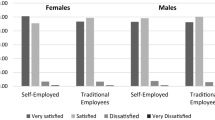Summary
School leavers were surveyed before leaving school and again four years later. Longitudinal data showed increased self-esteem, decreased externality and decreased depressive affect in those classified as Satisfied Employed, while the Dissatisfied Employed and Unemployed showed smaller increases in self-esteem, smaller decreases in externality, and no decreases in depressive affect. Cross-sectional data using the General Health Questionnaire confirmed that the Satisfied Employed were better adjusted psychologically than the other two groups, which did not differ. This suggests that satisfactory employment results in improved psychological well-being rather than unsatisfactory employment, or unemployment, leading to a deterioration.
Similar content being viewed by others
References
Bakke EW (1933) The unemployed man: a social study. Nisbet, London
Bakke EW (1940a) Citizens without work: a study of the effects of unemployment upon the workers' social relations and practices. Yale University Press, New Haven
Bakke EW (1940b) The unemployed worker: a study of the task of making a living without a job. Yale University Press, New Haven
Banks MH (1983) Validation of the General Health Questionnaire in a young community sample. Psychol Med 13: 349–353
Banks MH, Jackson PR (1982) Unemployment and risk of minor psychiatric disorder in young people: cross-sectional and longitudinal evidence. Psychol Med 12: 789–798
Beck AT, Ward CH, Mendelson M, Mock J, Erbaugh J (1961) An inventory for measuring depression. Arch Gen Psychiatry 4: 53–63
Broom L, Jones F (1969) Career mobility in three societies: Australia, Italy, and the United States. Am Soc Rev 34: 650–658
Donovan A, Oddy M (1982) Psychological aspects of unemployment: An investigation into the emotional and social adjustment of school leavers. J Adolescence 5: 15–30
Eisenberg P, Lazarsfeld PF (1938) The psychological effects of unemployment. Psychol Bull 35: 358–390
Erikson EH (1959) Identity and the life cycle. Psychol Issues 1: 50–100
Feather NT (1985) The psychological impact of unemployment: empirical findings and theoretical approaches. In: Feather NT (ed) Australian psychology: review of research. Allen & Unwin, Sydney
Finlay-Jones R, Eckhardt B (1981) Psychiatric disorder among the young unemployed. Austr N Z J Psychiatry 15: 265–270
Freud S (1930) Civilization and its discontents. Hogarth, London
Furnham A (1985) Youth unemployment: a review of the literature. J Adolescence 8: 109–124
Goldberg DP (1972) The detection of psychiatric illness by questionnaire. Oxford University Press, London
Goldberg DP (1978) Manual of the General Health Questionnaire. NFER Publishing Company, Windsor
Goldberg DP (1981) Estimating the prevalence of psychiatric disorder from the results of a screening test. In: Wing JK, Bebbington P, Robins LN (eds) What is a case? Grant MacIntyre, London
Goldberg DP, Hillier VF (1979) A scaled version of the General Health Questionnaire. Psychol Med 9: 139–145
Gurney RM (1980) Does unemployment affect the self-esteem of school leavers? Austr J Psychol 32: 175–182
Gurney RM (1981) Leaving school, facing unemployment, and making attributions about the causes of unemployment. J Vocat Behav 18: 79–91
Hartley JF (1980) The impact of unemployment upon the self-esteem of managers. J Occup Psychol 53: 147–155
Jahoda M (1979) The impact of unemployment in the 1930s and the 1970s. Bull Br Psychol Soc 32: 309–314
Jahoda M (1981) Work, employment and unemployment: values, theories and approaches in social research. Am Psychol 36: 184–191
Jahoda M (1982) Employment and unemployment. Cambridge University Press, Cambridge
McPherson A, Hall W (1983) Psychiatric impairment, physical health and work values among unemployed and apprenticed young men. Austr N Z J Psychiatry 17: 335–340
Nowicki S, Duke MP (1974) A locus of control scale for noncollege as well as college adults. J Pers Assess 38: 136–137
O'Brien GE (1985) Distortion in unemployment research: the early studies of Bakke and their implications for current research on employment anunemployment. Hum Rel 38: 877–894
O'Brien GE, Kabanoff B (1979) Comparison of unemployed and employed workers on values, locus of control and health variables. Austr Psychologist 14: 143–154
Patton W, Noller P (1984) Unemployment and youth: a longitudinal study. Austr J Psychol 36: 399–413
Rosenberg M (1965) Society and the adolescent self-image. Princeton University Press, Princeton
Shamir B (1986) Self-esteem and the psychological impact of unemployment. Soc Psychol Q 49: 61–72
Stafford EM (1982) The impact of the Youth Opportunities Programme on young people's employment prospects and psychological well-being. Br J Guidance Counselling 10: 12–21
Stafford EM, Jackson PR, Banks MH (1980) Employment, work involvement and mental health in less qualified young people. J Occup Psychol 53: 291–304
Taylor KF, Gurney RM (1984) So you're thinking of studying unemployment? In: Nixon MC (ed) Issues in psychological practice. Longman Cheshire, Melbourne
Tiffany DW, Cowan JR, Tiffany PM (1970) The unemployed: a socio-psychological portrait. Prentice Hall, Englewood Cliffs
Tiggemann M, Winefeld AH (1984) The effects of unemployment on the mood, self-esteem, locus of control and depressive affect of school leavers. J Occup Psychol 57: 33–42
Warr PB (1983) Work, jobs and unemployment. Bull Br Psychol Soc 36: 305–311
Warr PB (1984) Economic recession and mental health: a review of research. Tijdschrift Soc Gezondheidszorg 62: 298–308
Warr PB, Cook JP, Wall TD (1979) Scales for the measurement of some work attitudes and aspects of psychological well-being. J Occup Psychol 52: 129–148
Warr PB, Jackson PR (1983) Self-esteem and unemployment among young workers. Trav Hum 46: 355–366
Warr PB, Jackson PR (1984) Men without jobs: some correlates of age and length of unemployment. J Occup Psychol 57: 77–85
Winefield AH, Tiggemann M (1985) Psychological correlates of employment and unemployment: Effects, predisposing factors, and sex differences. J Occup Psychol 58: 229–242
Wing JK, Cooper JE, Sartorius N (1974) The measurement and classification of psychiatric symptoms. Cambridge University Press, Cambridge
Author information
Authors and Affiliations
Rights and permissions
About this article
Cite this article
Winefeld, A.H., Tiggeman, M. & Goldney, R.D. Psychological concomitants of satisfactory employment and unemployment in young people. Soc Psychiatry Psychiatr Epidemiol 23, 149–157 (1988). https://doi.org/10.1007/BF01794781
Accepted:
Issue Date:
DOI: https://doi.org/10.1007/BF01794781




